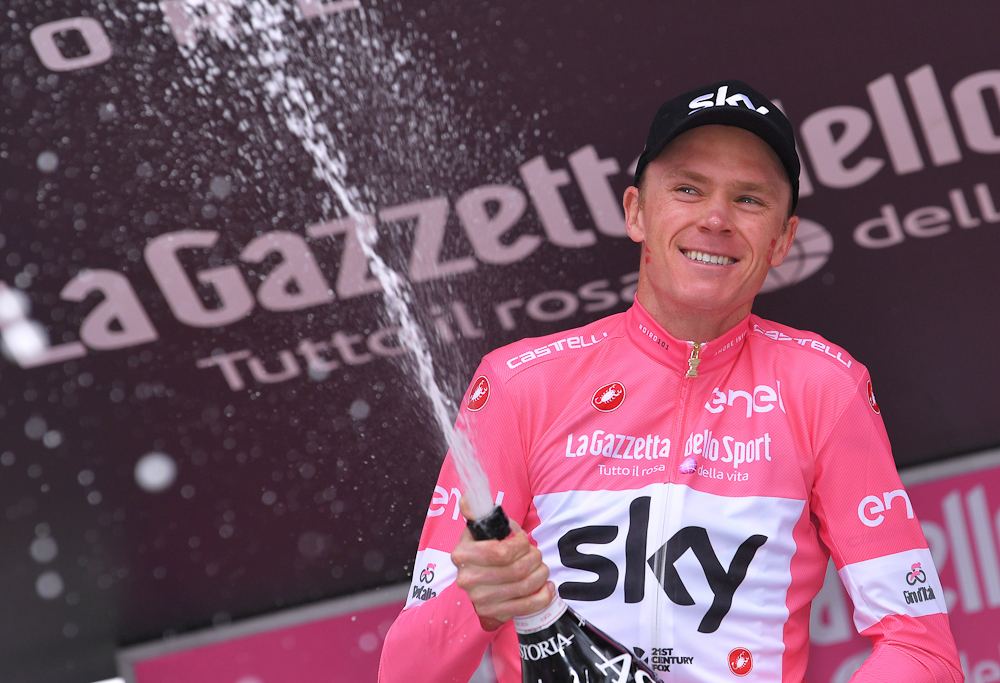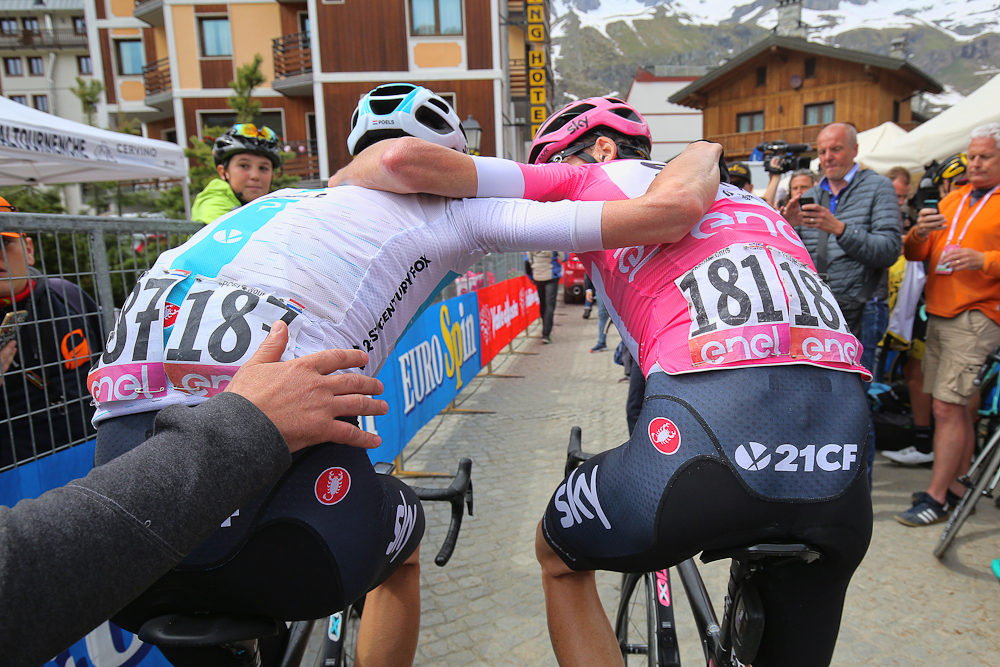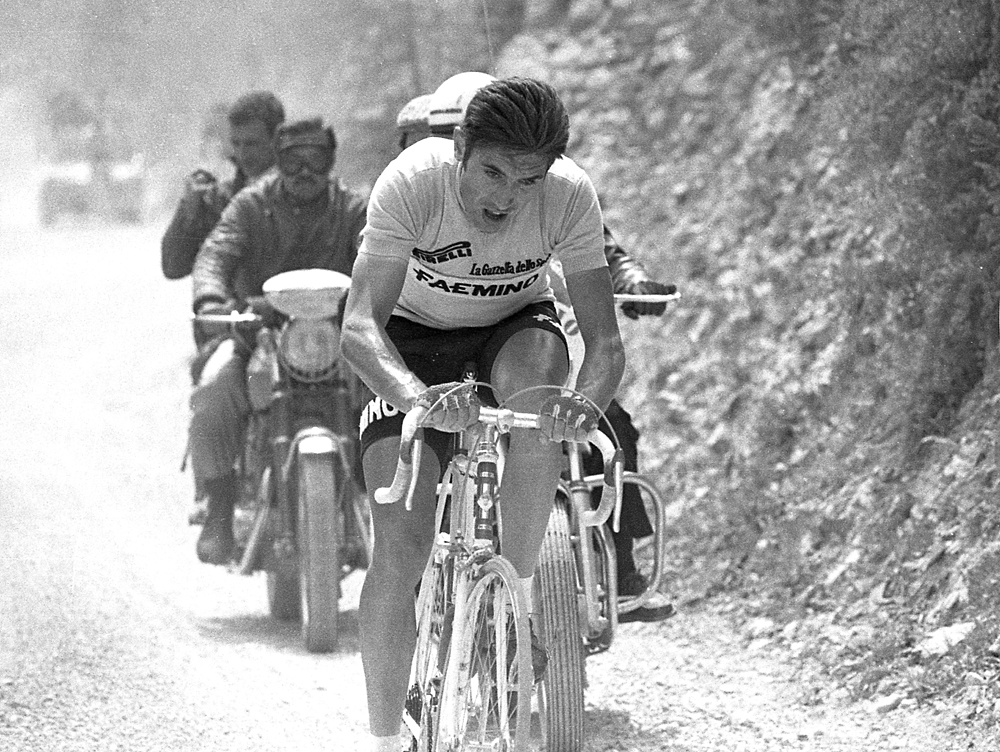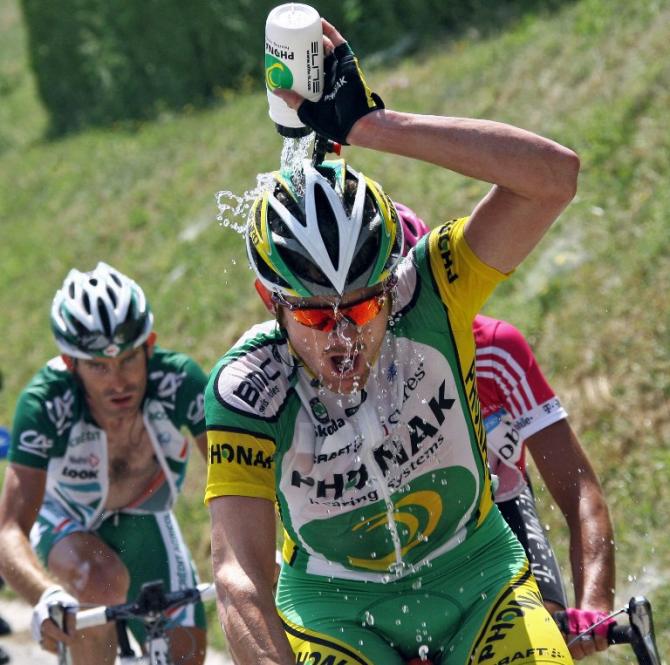Chris Froome takes a provisional place in history with Giro d'Italia victory
Briton's Grand Tour hat-trick could be undone by salbutamol case




When Chris Froome announced his intention to ride the Giro d'Italia via a short video at the route presentation in November, it was with the objective of emulating Eddy Merckx and Bernard Hinault by winning cycling's three Grand Tours in succession.
Chris Froome: I have a clear conscience
Bennett defends his 'Froome did a Landis' comments
Chris Froome ready to ride into Rome in pink as sprinters fight for a final victory
Giro d'Italia: Chris Froome takes a third straight Grand Tour victory
Chris Froome: The next challenge for me has to be the Tour de France
The initial hype surrounding the proposed 'Froome Slam' was rather dulled two weeks later when it emerged that the Team Sky rider had returned a positive test for salbutamol en route to Vuelta a España victory in September.
The case has yet to be resolved and Froome will lose his Vuelta title if he is found guilty of an anti-doping rule violation, and so his place in history is very much a provisional one at this juncture, despite Merckx telling La Gazzetta dello Sport, "I welcome him to the club."
And so, while the salbutamol case proceeds at a glacial pace, Froome sits – at least for the time being – alongside Merckx and Hinault as the only riders to hold the Tour de France, Vuelta and Giro titles at the same time. He also joins – provisionally, of course – Merckx, Hinault, Jacques Anquetil, Felice Gimondi, Alberto Contador and Vincenzo Nibali as the only riders to win all three Grand Tours during their careers.
Merckx notched up his triple by completing the Giro-Tour double in 1972, and then adding the Vuelta (then held in spring) the following year. The Belgian proceeded to win his fourth Giro immediately afterwards, but the Grand-Tour-winning sequence ended when he opted against competing in the 1973 Tour de France.
A decade on from Merckx, Bernard Hinault completed the Giro-Tour double in 1982, and then added the 1983 Vuelta. The Frenchman's run of successive Grand Tour wins stopped at three after a knee injury prevented him from defending both his Giro and Tour crowns that summer.
In Sunday's edition of La Gazzetta dello Sport, Merckx was generous in his praise of Froome's Giro and, in particular, his startling 80km break on stage 19 after attacking on the Colle delle Finestre. Following what had been a subdued Giro to that point – his Zoncolan victory notwithstanding – Froome moved from fourth to first overall by winning the stage by three minutes in the most astonishing fashion.
The latest race content, interviews, features, reviews and expert buying guides, direct to your inbox!
"Attacking on the Colle delle Finestre, a really hard climb, was the only way that Froome could turn around a difficult situation," Merckx said. "It was 80km from the finish, but he had no choice. The team was decisive because his other rivals were isolated, but he did so much by himself. He surprised me. I didn't expect it. He had never done anything like that – even at the Tour. Maybe he found some inspiration that he'd never had before."
Froome's escape on the Finestre drew comparisons with solo efforts of yesteryear such as Fausto Coppi on the road to Pinerolo in 1949, Marco Pantani on the Galibier in 1998 and Floyd Landis en route to Morzine in 2006. When George Bennett (LottoNL-Jumbo) likened Froome's exploit to that of Landis – who was later stripped of the result after testing positive for testosterone – his LottoNL-Jumbo team felt moved to clarify that his comparison was not an insinuation. In professional cycling, placing results in an historical context is a fraught task.
Merckx's own career was peppered with solo exploits, the most famous of which was perhaps his 130km raid on the road to Mourenx at the 1969 Tour, which began seemingly on a whim after he claimed the king of the mountains sprint on the Tourmalet. Already secure in the yellow jersey, Merckx rode alone over the Aubisque to win the stage by almost eight minutes. Merckx's domination of the 1969 Tour came after he had been excluded from that year's Giro when he tested positive for the stimulant Reactivan in Savona.
"What Froome did on Friday wasn't just muscles, legs and power. He put his heart into it," Merckx said. "It was a heroic feat of cycling. I did a lot of attacks from distance myself. I don't remember the exact number of kilometres, but that's not important – they're only numbers. What counts more are the emotions you feel and the memory you leave."
Modern era
Since the Vuelta was shifted from spring to its current, late-season slot on the calendar in 1995, no rider before Froome had even attempted to win a third Grand Tour in succession. Marco Pantani was the only rider in that timeframe to achieve the Giro-Tour double, but he immediately dismissed the idea of riding the Vuelta in search of a calendar-year treble.
Ahead of the 2015 season, meanwhile, Tinkoff owner Oleg Tinkov proposed putting up a €1 million prize for Froome, Alberto Contador, Nairo Quintana and Vincenzo Nibali to compete in the Giro, Tour and Vuelta in the same year. Tinkov's own rider, Contador, was the only one of their number to line up at the Giro, however, and the idea never resurfaced. Contador won that Giro, but he could only manage fifth at the Tour, and did not participate in the Vuelta.
When Froome carried the red jersey to the end of the 2017 Vuelta after claiming his fourth Tour de France in July, the idea of a Grand-Tour triple was suddenly revived, though he was initially coy about the possibility of riding the Giro in 2018, despite the very public overtures of race director Mauro Vegni.
An appearance fee rumoured to be in the region of €1.4 million seemed to loosen Froome of his reticence. By that point, Team Sky already knew that Froome had returned a urine sample containing twice the permissible limit of salbutamol at the 2017 Vuelta, but still they continued the negotiations without informing RCS Sport of the case.
Speaking ahead of the Giro start in Jerusalem, Vegni claimed that he had received assurances from UCI president David Lappartient that Froome's final result would stand regardless of whether he was sanctioned for his salbutamol positive. That evening, the UCI issued a statement denying any such pledge, and when Lappartient visited the Giro during the third week, he reaffirmed that there had been no guarantee that Froome's final result would stand.
As things stand, Froome has now won six Grand Tours – four Tours, one Vuelta and one Giro – which is the most of any active rider, but it is still wholly unclear if that tally will remain in place if he is sanctioned for his salbutamol positive. Froome evinced confidence throughout the Giro that he will be cleared of wrongdoing and will not be stripped of any results, but the race reached Rome amid the same uncertainty that shrouded Contador's 2011 win, which was later revoked when he received a backdated ban for his 2010 positive test for clenbuterol.
"After three weeks of real spectacle, the Giro is on the brink of a precipice. Like a prisoner awaiting judgement," wrote Cristiano Gatti of Tuttobici. "The toxic cloud that lingered over the start is even darker and more dense, because we now know that one of the most beautiful editions of recent decades could finish up in the mincer."
After the festivities ended in Rome on Sunday, Froome was set to turn his attention to defending his Tour title – "I'm certainly planning to go there and give it everything," he said – and, unless his case is resolved in the next six weeks, the uncertainty that clouded this Giro will simply shift north of the Alps to the Tour.
The situation is anomalous, but Froome, it seems, will target the Tour as normal. Business as usual. And Merckx reckons Froome's prospects to be good. "But first he should enjoy the Giro," Merckx told La Gazzetta. "He deserved it. And he made it unforgettable."
However the 2018 Giro comes to be recorded by posterity, that much is true.

Barry Ryan was Head of Features at Cyclingnews. He has covered professional cycling since 2010, reporting from the Tour de France, Giro d’Italia and events from Argentina to Japan. His writing has appeared in The Independent, Procycling and Cycling Plus. He is the author of The Ascent: Sean Kelly, Stephen Roche and the Rise of Irish Cycling’s Golden Generation, published by Gill Books.